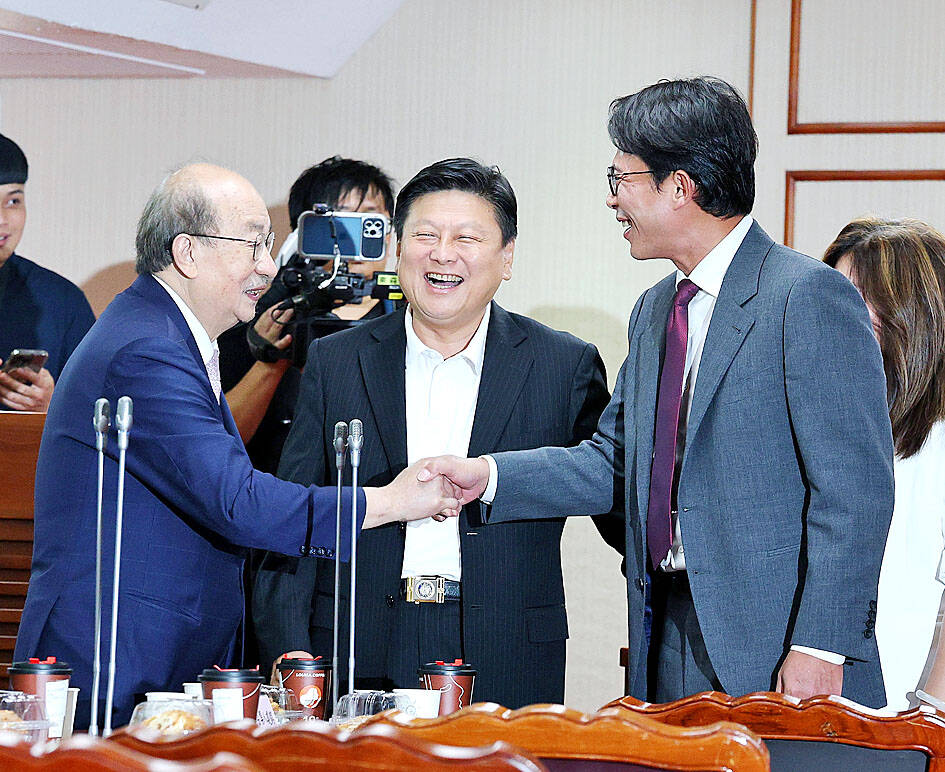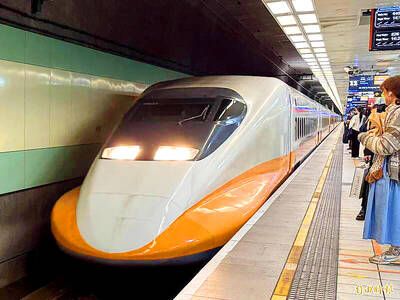The Democratic Progressive Party (DPP), the Chinese Nationalist Party (KMT) and the Taiwan People’s Party (TPP) each commented on their respective legislative priorities yesterday as the Legislative Yuan began a new session.
The Cabinet listed nine draft bills as top priorities for the new session, including measures related to the economy, disadvantaged groups, youth, indigenous affairs, health insurance data, childcare services, artificial intelligence and protections for people with disabilities.
Cabinet spokeswoman Michelle Lee (李慧芝) said the package includes amendments to the Indigenous Peoples Employment Rights Protection Act (原住民族工作權保障法), the Personal Data Protection Act (個人資料保護法), the People with Disabilities Rights Protection Act (身心障礙者權益保障法) and the Business Mergers and Acquisitions Act (企業併購法).

Photo: CNA
Other priority bills would be reviewed by newly appointed Executive Yuan Deputy Secretary-General Ruan Zhao-syong (阮昭雄), who is to also coordinate with Legislative Yuan caucuses, Lee said.
Meanwhile, the KMT said it intends to pursue reforms to the Local Government Act (地方制度法), military and civil servant pensions, referendum and election law, and subsidies.
KMT caucus deputy secretary-general Lin Pei-hsiang (林沛祥) said the bills have “not yet been discussed” or even drawn up, and that “nothing has been finalized.”
“Whether it is a referendum-election combination or pension reform, we will engage in thorough communication with the TPP, and after mutual understanding, release either separate or integrated versions,” Lin said.
TPP caucus whip Huang Kuo-chang (黃國昌) said his party would promote amendments to the Referendum Law (公民投票法) to combine referendums with elections.
Meanwhile, a DPP source said that President William Lai (賴清德), who also chairs the DPP, has invited DPP lawmakers from different factions to his official residence.
According to the source, Lai’s goal is to build consensus and ensure the general budget passes smoothly.

The inspection equipment and data transmission system for new robotic dogs that Taipei is planning to use for sidewalk patrols were developed by a Taiwanese company, the city’s New Construction Office said today, dismissing concerns that the China-made robots could pose a security risk. The city is bringing in smart robotic dogs to help with sidewalk inspections, Taipei Deputy Mayor Lee Ssu-chuan (李四川) said on Facebook. Equipped with a panoramic surveillance system, the robots would be able to automatically flag problems and easily navigate narrow sidewalks, making inspections faster and more accurate, Lee said. By collecting more accurate data, they would help Taipei

TAKING STOCK: The USMC is rebuilding a once-abandoned airfield in Palau to support large-scale ground operations as China’s missile range grows, Naval News reported The US Marine Corps (USMC) is considering new sites for stockpiling equipment in the West Pacific to harden military supply chains and enhance mobility across the Indo-Pacific region, US-based Naval News reported on Saturday. The proposed sites in Palau — one of Taiwan’s diplomatic allies — and Australia would enable a “rapid standup of stored equipment within a year” of the program’s approval, the report said, citing documents published by the USMC last month. In Palau, the service is rebuilding a formerly abandoned World War II-era airfield and establishing ancillary structures to support large-scale ground operations “as China’s missile range and magazine

A 72-year-old man in Kaohsiung was sentenced to 40 days in jail after he was found having sex with a 67-year-old woman under a slide in a public park on Sunday afternoon. At 3pm on Sunday, a mother surnamed Liang (梁) was with her child at a neighborhood park when they found the man, surnamed Tsai (蔡), and woman, surnamed Huang (黃), underneath the slide. Liang took her child away from the scene, took photographs of the two and called the police, who arrived and arrested the couple. During questioning, Tsai told police that he had met Huang that day and offered to

BETTER SERVICE QUALITY: From Nov. 10, tickets with reserved seats would only be valid for the date, train and route specified on the ticket, THSRC said Starting on Nov. 10, high-speed rail passengers with reserved seats would be required to exchange their tickets to board an earlier train. Passengers with reserved seats on a specific train are currently allowed to board earlier trains on the same day and sit in non-reserved cars, but as this is happening increasingly often, and affecting quality of travel and ticket sales, Taiwan High-Speed Rail Corp (THSRC) announced that it would be canceling the policy on Nov. 10. It is one of several new measures launched by THSRC chairman Shih Che (史哲) to improve the quality of service, it said. The company also said